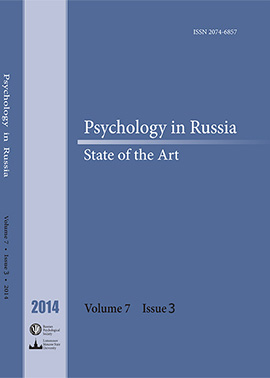Volume 7, Issue 3, 2014

Special Issue: Third Estoril Vigotsky Conference
Guest editors:
Joaquim Quintino-Aires (Portugal)
Margarida César (Portugal)
Joaquim Quintino-Aires (Portugal)
Margarida César (Portugal)
Editorial
Theory and methodology
-
“There is nothing so practical as a good theory”: How to let it work in practice (the case of Galperin’s theory)
Clinical psychology
-
Dynamics of the psychological features and clinical symptoms in mitral valve prolapse patients receiving long-term integrative psychotherapy for anxiety disorders
Social and educational psychology
-
Crafting a neo-Vygotskian approach to adult education in Portugal: Collaborative project work in an alternative curriculum









